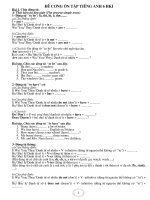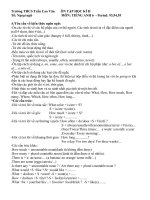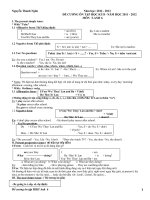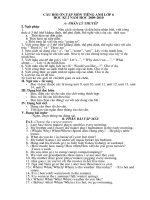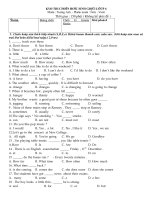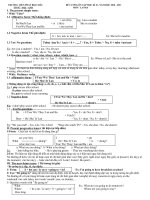Đề cương ôn tập anh 6 giữa kì 1
Bạn đang xem bản rút gọn của tài liệu. Xem và tải ngay bản đầy đủ của tài liệu tại đây (200.09 KB, 15 trang )
Name:…………….....…Class: 6….
Phủ
định
ĐỀ CƯƠNG ÔN TẬP GIỮA KỲ I
MÔN: TIẾNG ANH– LỚP 6
NĂM HỌC: 2022- 2023
TOPICS: From unit 1 to unit 3
-
-
Nghi
vấn
A. VOCABULARY
Unit 1: My new school
Unit 2: My house
Unit 3: My friends
C. PRONUNCIATION
- Sounds: /ɑː/ and /ʌ/;
Final sounds: /s/ and /z/
Sounds: /b/ and /p/
D. GRAMMAR:
1. Present simple (thì hiện tại
đơn):
You/We/They/ danh từ số
nhiều
I
He/She/lt/danh từ số ít
Are
You/We/They/ danh từ số
nhiều
are not
Am
Is
I + ...?
he/she/it/danh từ
+...?
you/we/theỵ/danh từ
nhiều +...?
Are
1.1 Cách chia động
từ thường ở thì
hiện tại đơn như
sau:
Thể
Chủ ngữ
Động từ (V)
Khẳng
He/She/lt/ danh từ số V + s/es
định
ít
l/You/We/They/ danh V (nguyên thể)
từ số nhiều
Phủ
He/She/lt/ danh từ số does not (doesn’t) + V
ít
thể)
định
l/You/We/They/ danh do not (don’t) +
từ số nhiều
V (nguyên thể)
Nghi
vấn
Does + he/she/it/ danh V (nguyên thể)...?
từ số ít...
Do + l/you/we/they/
danh từ số nhiều
1.1 Cách chia động từ "to be” ở thì
hiện tại đơn như sau:
Thể
Chủ ngữ
Khẳng
I
định
He/She/lt/danh từ số ít
am not
is not
1.2 Cách dùng thì
hiện tại đơn:
- Thói quen hằng ngày.
VD
:
Am
Is
1
T
h
e
y
V (nguyên thể)...?
d
r
i
v
e
l
á
i
x
e
t
o
đ
i
t
h
e
l
à
m
.
)
o
f
f
i
c
e
S
ự
e
v
e
r
y
v
i
ệ
c
h
a
y
d
a
y
.
s
ự
(
H
ằ
n
g
t
h
ậ
t
n
g
à
y
h
i
ể
n
h
ọ
n
h
2
i
ê
n
.
My boyfriend
sometimes writes to
me.
+ Sau động từ “to be”:
S
h
e
VD: We have two children. (Chúng
tơi có 2 đứa con.)
- Sự việc sẽ xảy ra trong tương lai
theo thời gian biểu hay lịch trình.
VD: Christmas Day falls
on a Monday this year.
(Năm nay Giáng sinh rơi
vào ngày thứ Hai.) 4. Dấu
hiệu nhận biết:
- Nhóm trạng từ đứng ở trong câu:
Always (ln ln) usually (thường
xuyên), often (thường), sometimes
(thỉnh thoảng), rarely (hiếm khi),
seldom (hiếm khi), frequently
(thường xuyên), hardly (hiếm khi),
never (không bao giờ), regularly
(thường xuyên)…
- Các trạng từ này thường đứng trước
động từ thường, đứng sau động từ
“tobe” và trợ động từ Ví dụ: He
rarely goes to school by bus Nhóm trạng từ đứng ở cuối câu:
Every day/ week/ month/ year (hàng
ngày/ hàng tuần/ hàng tháng/ hàng
năm)
Once (một lần), twice (hai lần), three
times (ba lần), four times (bốn lần)…
i
s
a
l
w
a
y
s
v
e
r
y
h
a
p
p
y
.
+
S
a
u
2. Adverbs of frequency:
- Trạng ngữ chỉ tần suất được dùng
khi muốn biểu đạt hay mô tả về mức
độ thường xuyên của một hành động
nào đó:
Always, usually, sometimes, never,
occasionally, rarely, seldom,
frequently, often, regularly, hardly
ever. - Vị trí của trạng ngữ chỉ tần
suất: + Trước động từ thường:
t
r
ợ
đ
ộ
n
g
3
t
ừ
:
sắp xảy ra trong tương lai
gần. Thường diễn tả một
kế hoạch đã lên lịch sẵn
VD: I am flying to London
tomorrow. (Tôi sẽ bay sang
Luân Đôn sáng ngày mai)
- Hành động
thường
xuyên lặp đi
lặp lại gây
sự bực
mình, khó
chịu cho
người nói.
Cách dùng
này được
dùng với
trạng từ
“always”
V
D
:
H
e
He doesn’t usually play
football.
3. Present contiuous (thì hiện tại
tiếp diễn):
3.1. Cấu trúc:
i
s
3.2. Cách dùng: - Diễn
đạt một hành động đang
xảy ra tại thời điểm nói.
VD: I am eating my lunch right now.
- Diễn tả một hành
động hoặc một sự
việc nói chung
đang diễn ra
nhưng khơng nhất
thiết phải thực sự
diễn ra ngay lúc
nói.
VD: I’m quite busy these days. I’m
doing my assignment. (Dạo này
tôi khá là bận. Tôi đang làm luận
án) - Diễn đạt một hành động
a
l
w
a
y
s
l
o
s
i
n
g
h
i
s
4
keys.
(Anh
ấy cứ
hay
đánh
mất
chìa
khóa)
3.3.
Dấu
hiệu
nhận
biết:
Động từ kết thúc bởi 1 ngun âm (u,e,o,a,i) + Get - gettin
1 phụ âm, ta gấp đôi phụ âm cuối rồi thêm –
ing.
-
-
Trong câu có các
trạng từ chỉ thời
gian: now (bây
giờ), right now
(ngay bây giờ), at
the moment (lúc
này), at present
(hiện tại), at this
time (bây giờ), at +
giờ cụ thể (at 12
o’clock)
Trong câu có các từ
như: Look! (nhìn
kìa), Listen (hãy
nghe này), Keep
silent! (Trật tự), Be
careful! (Cẩn thận),
Hurry up! (Hãy
nhanh lên)…
4. Sở hữu cách – Possessive
Case
4.1. Định nghĩa:
Sở hữu cách (possessive case)
là một hình thức chỉ quyền sở
hữu của một người đối với một
người hay một vật khác để từ
đó làm rõ thêm cho đối tượng
đang được nhắc đến.
4.2. Công thức:
Người
l
à
m
c
h
ủ
+
'
S
+
v
ậ
t
/
3.4. Các quy tắc thêm –ing vào sau
động từ:
Các quy tắc
n
Động từ kết thúc bởi “e”, ta bỏ “e” thêm “ing”
g
ư
ờ
Động từ kết thúc bởi “ee”, ta thêm “ing” mà
i
không bỏ “e”
Động từ kết thúc bởi “ie”, ta đổi “ie” thành
t
“y” rồi thêm đuổi “ing”
h
u
5
ộ
c
a
n
.
q
u
y
ề
n
L
a
n
’
s
s
ở
f
a
t
h
e
r
:
h
ữ
u
V
í
b
ố
d
ụ
:
c
ủ
a
L
a
n
’
s
L
a
n
.
h
o
u
s
e
:
4.3. Cách viết sở
hữu cách
(Possessive case ):
- Thêm ‘s vào sau
danh từ số ít.
Ví dụ:Ben’s pen is so sharp.
(Cây bút của Ben rất bén.)
- Thêm ‘s vào danh
từ số ít nhưng có s
cuối mỗi từ (như
tên riêng, hoặc
danh từ có s sẵn).
n
h
à
c
ủ
a
L
6
-
-
-
-
4. A. compass
B.
homework
C.
someone
D.
wonderful
5. A. fun
B.
student
C. studio
D. stupid
6. A. cats
B.
lamps
C.
cupboards
D. clocks
7. A. cookers
B.
months
C. posters
D. tables
8. A. lights
B.
armchairs
C. sofas
D. pictures
9. A. gardens
B.
sinks
C. stoves
D. drawers
10. A. photographs
B.
flats
C. aunts
D. schools
II. Choose the word that
differs from the others in the
position of primary stress in
each of the following
questions.
1. A. classmate
B.
compass
C. enjoy
D. ruler
2. A. equipment
B.
rubber
C. excited
D. activity
3. A. aerobics
B.
textbook
C.
notebook D. library
4. A. return
B.
expensive C. exercise D.
piano
5. A. kitchen
B.
bedroom
C.
cupboard D. apartment
Ví dụ:Doris’s coat (áo
khốc của Doris)
My boss’s wife (vợ của sếp tôi)
Thêm ‘s vào danh từ số
nhiều không có s Ví
dụ:Children’s clothes (áo
quần của trẻ em).
Chỉ thêm dấu phẩy, khơng
thêm s đối với danh từ là
số nhiều có s Ví
dụ:Books’ cover (Bìa của
những quyển sách).
Khi muốn nói nhiều
người cùng sở hữu một
vật hay nói cách khác là
có nhiều danh từ sở hữu
thì ta chỉ thêm kí hiệu sở
hữu vào danh từ cuối.
Ví dụ:Lan and Hoa’s glasses are so
expensive. (Kính của Lan và Hoa rất
đắt.)
Tuy nhiên: nếu hàm ý là
Lan và Hoa mỗi người
sở hữu một cặp mắt kính
thì ta sẽ viết: Lan’s and
Hoa’s glasses are so
expensive.
E. EXERCISES:
I. Choose the word whose
underlined part differs from the
others in pronunciation in each of
the following questions.
1. A. study
B. lunch
C. subject
D.
computer
2. A. calculator
B.
parking lot
C. garden
D. father
3. A. smart
B. sharpener
C. grammar D. star
7
6. A. computer
B. behind
A. shoes
B. uniform
C. bag
D. hats
C. between
D.
window
11. Students live and study in
a/an ________ school. They
7. A. cooker
B. beside
only go home at weekends..
C. bathroom D. pillow
A. international
B. small
8. A. tomato
B. funny
C. boarding
C. active
D. careful
D. overseas
9. A. machine
B. clever
12. My best friend ______ a
C. museum
D. eraser
round face and big eyes.
III. Mark the letter A, B, C, D to
A. have
B. gets
indicate the correct answer to each
C.is
D.
of following the questions.
has
1. James is ______ judo in the
13. I sit ______ Sarah at
playground with his friends and he is
school.
very excited.
A. on
B. next to
A. do
B. doing
C. between
D.
2. He usually ________ a taxi to the railway station.
A. taking
B. take
in
3. She ________ like playing tennis.
14. Our family stays ______ a
A. doesn’t
B. don’t
stilt house.
4. Some teachers ____________ much homework.
A. in
B. on
A. is give
B. gives
C. in front of
5. My brother ______ badminton in the evening15. Don’t stand ________ the
A. don’t play
B. doesn’t play
TV I’m trying to watch this
6. Look! These birds _______ on the tree over there.
programme.
A. sings
B. sing
C. is singing
A. behind
B. next to
7. My father ________ coffee in the
C. under
D.
living room now.
in front of
A. drinks
B. drink
16. We are excited the first day of
C. is drinking
school.
8. Nam and Minh ________soccer in
A. at
B. about
the yard at the moment.
C. with
A. aren’t
D. in
playing
17. My mother is in the
B. playing
________ baking a cake for
C. isn’t
my birthday.
playing
A. bathroom
B. dinning
D. plays 9.
room
C. kitchen
What time
D. bedroom
every
18. Please turn the ________
morning?
on. It’s so hot in here.
A. do Mai gets up
B. does Mai gets up
A.fan
B. light
C. does Mai get up D. does get Mai up
C. television
10. Phong is wearing a school
.
8
19. My room is so ________! Dirty
8. How often does you go to the
clothes, toys, books are all over
cinema?
the floor!
9. Jerry always buy flowers at
A. messy
B. crazy
weekends.
20. She is always
at school, and helps
otherroom
students
with
their
10. Elena’s
is in the
second
homework.
floor.
A. hard
B. hardly
11. This dollhouse is my
21. Daisy is very
to take the test. She is a daughter
very good
student.
toy.
A. kind
B. confident
V. Choose the best response,
22. My close friend, Mai, has a
A, B or C, to complete these
face
short dialogues.
and
hair.
1. “How’s it going?” “____________”
A. big - black
A. To the cinema.
B. I’m
B. small - short
fine, thanks. C. See you later.
C. round - black
2. “My name’s Daniel.” “D. short - long 23. It
____________”
is called the Tiger
A. Pleased to meet you.
B.
room
there is
Happy
to
see
you.
C.
Nice
to
hear
a big tiger on the
you.
wall.
3. “How much is that?” “A. because
B. so
____________”
C. but
D. like
A. It’s at 4 o’clock.
B. It’s
IV. Mark the letter A, B, C, D to
in
the
fridge.
C.
It’s
90.000
VND.
indicate the underlined part that
needs correction in each of the
4. “Has Jenifer got a nice
following questions
personality?” “1. The school is finishing at three thirty
____________”
in the afternoon.
A. Yes, she’s got blonde hair.
B.
Yes,
she’s
very
pretty.
C.
Yes,
she’s
2. Mai can’t answer the phone because
very friendly.
she takes a shower at the moment.
3. My brother and I always rides the
5. “How many chairs are
bicycles to school from Monday to
there?” “- ____________”
Saturday.
A. There isn’t much.
B. There
4. My Dad is reading two books every
aren’t any.
C. There is a lot.
week.
6. “Can you give me a hand?”
5. Donata is very rude. She has a lot of
“- ____________”
friends.
A. Sure
B. No,
6. Tom sits on Lucy and James in his
thanks.
C. I’m hungry.
class.
7. ‘How is your first day at
7. Peter usually doesn’t get up before
school?’
seven.
A. By bicycle.
B. Five
8. My brother is late never for school.
days a week.
9
C. That sounds great. D. Really exciting.
8. ‘Would you like to go for a drink?’
‘________’
A. Yes, I’d live to
B. No, I
wouldn’t.
C. Not at all.
D. Oh sorry
9. Marco, would you please erase the
blackboard for me?
A. Never mind
B. Yes, of
course, teacher.
C. You’re quite right
D Yes, I do
VI. Choose the word or phrase that
is CLOSEST in meaning to the
underlined part in each of the
following sentences.
1. Their funny stories make us laugh
a lot.
A. amusing
B. lovely
C. cute D. reliable
2. We organize expensive furniture
carefully.
A. act
B. show
C. watch
D. arrange
3. Nam is very smart. He always
answers the teacher’s question well.
A. bad
B. clever
C. lazy D. hardworking
4. Hoa is a good friend. She always
shares things with her classmate.
A. takes
B. listens C.
gives
D. wants
5. It is foolish of him to go out alone
at midnight.
A. smart
B. handsome
C. stupid
D. normal
VII. Choose the word of phrase
that is OPPOSITE in meaning to
underlined part in each of the
following sentences.
1. He is so generous that he often
pays for our drink.
A. mean
B. kind
C. nice D. reliable
10
2. Doing morning exercises is
an (a) exciting activity for
students.
A. happy
B. boring
C. hard
3. Our teacher remembers all of my classmates’ birthday.
A. gives
B. has
C. asks
4. The room is very untidy, so I have to clean it up.
A. messy
B. clean
C. crazy
5. In front of my school, there
is a big park, so we can go for
a walk after school.
A. In the middle of
B. Behind
C.
Under
D.
Between
VIII.
Choose the word or
phrase among A, B, C or D
that the best fits the blank
space in the following
passage.
My dream school is a quiet
school (1) ___________ we
have just two or three hours a
day, in the morning. Then, in
the afternoon, we can do
many (2) ___________ like
singing,dancing,
playing
soccer, basketball, rugby. We
won’t have tests and mark
either. The teachers will not
(3) ___________ homework,
so we can do whatever we
want after school. In my
dream school, we can also
choose the (4) ___________
we want: for example, you’re
not
going
to
learn
mathematics or physics if you
hate (5)___________. So it’s
a free school where you can
learn with calm and serenity
and you can make (6)
___________ friends during
afternoon activities!
1. A. what
B. where
The Vietnamese students take
2. A. subjects
B. actions
part in different after - school
3. A. give
B. take
C. do activities. Some students play
4. A. class
B. classrooms C. classmates
sports. They often play soccer,
5. A. it
B. them
C. her table tennis or badminton.
6. A. much
B. few
Sometimes they go swimming
IX. Choose the word or phrase among
in the swimming pools. Some
A, B, C or D that the best fits the
students like music, drama
blank space in the following
and movies. They often
passage.
practice playing musical
Wickedly Wonderful is a small
instrument in the school
summer (1) ______ in the UK for
music room. They join in the
children aged 6 to 13 years old. The
school theater group and
children (2) ______ a week outdoors
usually rehearse plays. Some
at the camp, making new friends
are members of the stamp
andlearning new activities (3)
collector’s club. They often
______ having a lot of fun. (4)
get together and talk about
______ the summer camp, they sail,
their stamps. A few students
horse ride, kayak, enjoy games on
stay at home and play video
the beach and the beach (5)______,
games or computer games.
swim, surf, go crabbing and ride
Most of them enjoy their
bikes. Children will enjoy holidays
activities after school hours.
with Wickedly Wonderful, and (6)
1. Which sports do some
______ are holidays that they will
students often play?
remember forever!
A. music, drama, movies and
1. A. term
A.course
soccer
C.camp
D.
B. soccer, table tennis,
holiday
badminton and music
2. A. take
B.spend
C. soccer, table tennis,
C.use
D. pass
badminton and swimming
3. A. which
B.what
D. video games, table tennies,
C.where
D. while
drama, music 2. How often
4. A. At
B. In
do they go swimming?
C.On
D. During
A. usually
B. sometimes
5. A. firingcamp
B.
C. always
D.
campfire
C.firecamp
rarely
D.firingcamp
3. Where do some students
6. A. this
B.that
often practice playing
C.these
D.
musical instruments?
those
A. At home B. At
X. Read the following passage and
a stamp club C. in
mark the letter A,B, C,D to
the swimming pool
indicate the correct answer to each
D. in the school
of the questions.
music room 4. How
11
many students stay at
home and play video
games or computer
games?
A. A little
B. A few
C. A lots
D. Many
5. What do the members of the
stamp collector’s club often do?
A
.
e
r
T
h
e
y
B
.
m
e
m
b
e
r
s
T
h
e
y
d
i
s
c
u
s
s
t
a
l
k
a
b
o
u
t
t
h
e
i
r
v
i
d
e
o
s
t
a
m
p
s
g
a
m
e
s
w
i
t
h
a
n
d
o
t
h
12
is really beautiful. 1. What is
the topic of the passage?
A
.
c
o
m
p
u
t
e
r
M
y
f
a
v
o
r
i
t
e
g
a
m
e
s
.
r
o
o
m
C. They discuss movies with other
members.
D. They talk about music and drama.
XI. Read the following passage and
mark the letter A,B, C,D to
indicate the correct answer to each
of the questions.
My dream house is a small one not
far from the sea. On the groundfloor, it has four rooms. The first
room is my living-room, with a
white sofa, a black armchair and a
coffee table. There is a lamp, a
French window with view of the
garden, a television set and a phone.
There is a modern kitchen, with a
fridge, and a door to the garden.
There is in bathroom with a shower
and a toilet. And there is a studyroom with a desk and my computer.
On the first floor, there is only my
bedroom. It has a wardrobe, a bed
and a television set. There is a
balcony with a view of the sea. The
walls of my house are white because
they make the house pure. My house
o
f
t
h
e
h
o
u
s
e
B
.
M
y
d
r
e
13
a
m
t
e
h
o
u
s
e
b
e
d
r
o
o
m
C
.
2. How many rooms are
there in the house?
A. 5
B. 4
C. 6
D. 3
3. There is a computer in the
________.
A. living room
B. bedroom
C. study room D. hall
4. The balcony is on the
_______ floor.
A. ground
B. first
C.
second
D. third
5. The word “pure” in the
last line is best replaced by
_________.
A. clean
B. messy
C. active
D.
attractive
XII. Rewrite the sentences as
directed.
Writ
e the
seco
nd
sente
nce
so
that
it
has a
simil
ar
mea
M
y
f
a
v
o
r
i
t
e
p
l
a
c
e
D
.
M
y
f
a
v
o
r
i
14
3. Ann/ usually/ surf/ Net /
evening.
……………………………
……………………………
……………………….
4. there/ flowers/ in the
garden?
……………………………
……………………………
……………………….
5. She/ walk/ school/ every
morning.
……………………………
……………………………
……………………….
ning to the
first one 1.
This year
my school
has 20
classes.
There are
………………………………………
…………………………...
2. When you are tired, you should
take a rest.
You had better
………………………………………
…………………………
3. My favorite room is the kitchen.
I like
………………………………………
……………………………………
4. Lan’s eyes are big and black.
Lan
………………………………………
……………………………………..
5. John has a sister, Jane.
Jane
.............................................................
.......................................................
6. The house is behind the trees.
There are
………………………………………
……………….........................
XIII. Make sentences, using the
words and phrases below
1. I/play/tennis/my friends/the
moment.
…………………………………
…………………………………
…………….
2. Lan/ usually/ do/ homework/
school library.
.......................................................
.......................................................
...............
15
